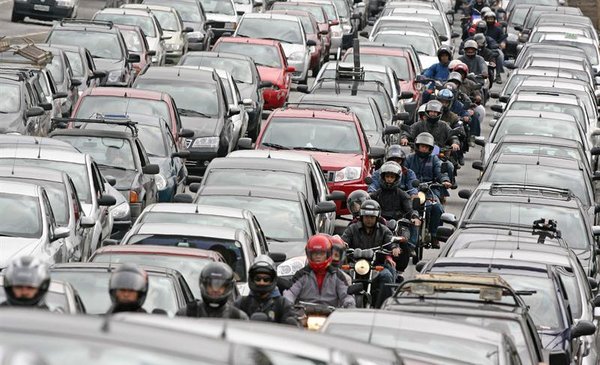The Uruguayan Automotive Trade Association (ACAU) published the statistics of 0 km vehicle sales in 2021. The union —whose brands and companies represented make up more than 80% of the country’s automotive market— registered 51,737 acquisitions by Uruguayan consumers in the year just ended. That number involved more than 15 thousand units above the 2020 figure (36,398 vehicles), which meant a 42% growth compared to a year ago, where the economic situation severely punished private consumption.
The brands that led in 2021
Passenger cars
Suzuki was the brand that sold the most in the segment of passenger cars with 5,401 units, (23% of the market share), which implied a growth of its sales of 27% compared to the previous year.
In second place Hyundai It was a surprise and ended 2021 with 4,071 vehicles sold. The South Korean company climbed three places in the category rankings from fifth place in 2020.
Completing the podium was Chevrolet, which completed the placement of 3,520 vehicles on the market last year; the fourth position was for Volkswagen, which sold 2,545 passenger cars. ACAU data shows both brands dropped one spot compared to last year’s list due to Hyundai’s rise. The other brand with a double-digit market share was Renault, which placed 2,482 units 0 km, only 63 less than Volkswagen.
The group of the five mentioned manufacturers represented a share of sales that exceeded three-quarters of the total of the segment. The top 10 was completed by companies Fiat, Nissan, Peugeot, Citroën Y Toyota, in that order.
Total, 23,593 passenger cars were sold in 2021 0 km according to ACAU data, a growth of 26% which materialized in almost 5,000 more acquisitions by Uruguayan consumers.
SUV vehicles
In the sport utility vehicles (called SUV, or light SUVs) the top four positions remained intact compared to 2021.
The leader of the sector was Volkswagen, which after placing 1,816 of these vehicles obtained a 17% stake in the division. Although in the main category European manufacturers were left off the podium, in this second place was also taken by another company from the old continent, Renault, which sold 1,129 SUVs.
As in 2020, after Volkswagen and Renault came Nissan Y Chevrolet, and the first variation came from the displacement of Chery to sixth place by Peugeot, which ranked fifth. From seventh place inclusive, they continued Toyota, Jeep, Hyundai Y Sling, respectively.
The last twelve months were one of extraordinary expansion for the category. The division went from 6,639 sales in 2020 to 10,382 in the year just ended, which meant an increase of 56%. In relative terms, while in 2020 7 SUV units were traded for every 20 passenger cars, in just 12 months the figure became 9 against 20 (note that the number of SUVs is not included in the number of cars because they are divisions different).
Light utility vehicles
Finally, the light utility vehicles they came to 14,660 units 0 km sold in 2021. The label refers to box vans, vans or small trucks, means of transport typically considered work.
Within this category, the undisputed leader was Fiat, which with its 5,295 vehicles placed outperformed its closest competitor by more than two and a half times. The Italian automaker took more than a third of the market share (increased its share by ten percentage points) and sold more than double the units of 2020.
Fiat stomped so hard in the segment that among the following three brands together –Renault, Volkswagen Y Toyota, from more to less— they failed to reach their numbers. The four brands mentioned were succeeded Nissan, Chevrolet, Peugeot, Citroën, DFSK and, to close the top 10, china Great wall motors.
Light utility vehicles had an appreciably more concentrated market than, for example, SUVs. In addition to the large portion of Fiat, the top ten light utility brands accounted for 90% of sales, while for the sport utility category the retailers that were left off the list accounted for more than a quarter of sales totals.
Trucks with strong dynamism
The trucking niche also showed strong dynamism in 2021. According to ACAU data, 2,903 cargo vehicles were marketed last year, which implied an expansion of 66% compared to the 1,748 trucks in 2020. Various items related to the Freight transport showed strong dynamism last year, such as industry, agriculture, forestry and construction.
In addition, the timber transport sector will have a strong boost this year due to the start-up of UPM’s second pastry plant in Paso de los Toros during the third quarter. As the completion of the Central Railroad work is scheduled for May 2023, the pulp mill plans to make up for the lack of the railway mode to transport its pulp and supplies with about 200 daily truck trips on Route 5 until the train work is delivered. . In addition, hundreds of daily wood trips from different parts of the country will be added to feed the new industrial plant with wood.
A year of improvement
The balance for 2021 ended up being largely positive for automotive companies and the main concessionaires operating in the country.
The Uruguayan automotive market not only left behind the harshest effects of the pandemic but also far exceeded the sales figures of 2019 and 2018. However, it should be remembered that the economic situation of the country before the pandemic no longer showed the dynamism of the best boom years of the previous decade, which had been reflected in the successive falls in the numbers of the automotive market.
In 2017, Uruguayans acquired 56,578 vehicles 0 km according to ACAU records, in 2018 they were 45,612, in 2019 they bought 42,335, in 2020 the figure was 36,398 and, finally, the number of 51,737 was reached in 2021.
Furthermore, in the last 12 months, the (certain stability) with which the price of the dollar fluctuated was a factor that played in favor of a clearly dollarized market. In the accumulated of the year, the greenback strengthened 5.6%.
“The first thing people and companies did with the arrival of the pandemic was to curb the cost of durable goods such as vehicles. The companies stopped the change of fleet or the incorporation of a new vehicle. In 2021, when they began to see the light at the end of the tunnel, they were encouraged to make those purchases that they had not made ”, he had explained to Ignacio Paz, manager of ACAU, when he analyzed the end of the first half of last year.







